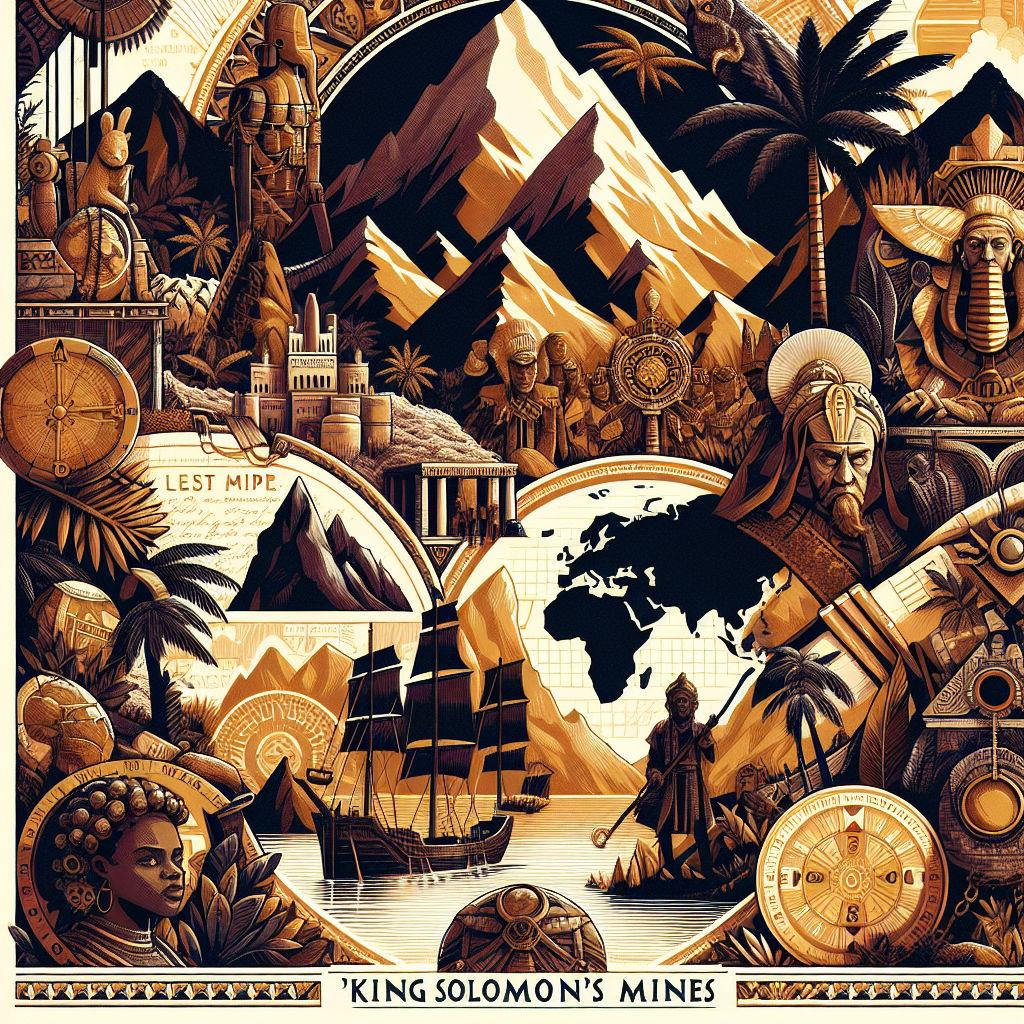Introduction
"Discover Ancient Treasures: An Exciting Journey Through King Solomon’s Mines" is a novel that revisits the legendary adventure more widely introduced by H. Rider Haggard’s 1885 classic, "King Solomon’s Mines." Haggard is renowned for his contribution to the adventure genre, and this particular work stands as a significant piece within his oeuvre and the broader scope of literary history. The novel is often celebrated for its thrilling narrative, vivid settings, and complex characters, which collectively allure readers into the mysterious heart of Africa, offering insights into the era’s imperialistic enthusiasm and fascination with "lost worlds."
Significance in Literature and Haggard’s Body of Work
Haggard’s works are cornerstones of the adventure genre, often credited with popularizing the "lost world" narrative. "King Solomon’s Mines" was groundbreaking for featuring an African expedition during a time when the continent was largely unknown to Western audiences, igniting curiosity and intrigue. The newer "Discover Ancient Treasures" retains this allure, fortifying Haggard’s legacy as a master of suspense and exploration. The narrative builds upon its predecessor by delving deeper into the cultural significance and purported riches of Solomon’s fabled mines, thus broadening the discourse on colonial exploration and exploitation.
Main Themes
The novel is richly interwoven with themes of adventure and discovery, imperialism, and the clash of civilizations. At its core, it is an exploration of the human drive to uncover the unknown—both geographically and within oneself. The miners’ journey serves as a metaphor for the quest for knowledge and power, touching on imperialistic motives that defined the 19th and early 20th centuries.
Adventure and peril are constants throughout the narrative, underscored by treacherous landscapes and encounters with formidable foes—both natural and human. The story also critically examines the ethical implications of European colonialism, highlighting the greed and cultural tensions that accompany the pursuit of wealth and domination.
Character Development
Haggard’s characters are intricately crafted, and their development throughout the story provides a microcosmic view of broader societal interactions. Allan Quatermain, the stalwart protagonist, exemplifies the quintessential Victorian explorer—stoic, resourceful, and morally ambiguous. In "Discover Ancient Treasures," Quatermain encounters an array of individuals who challenge and redefine his perceptions and objectives.
For instance, the character of Umbopa—later revealed as Ignosi, rightful king of Kukuanaland—serves as a conduit for discussing themes of identity and rightful leadership. His dual identity allows Haggard to navigate the complexities of cultural heritage and colonial interference, illustrating the novel’s deeper socio-political commentary. Quatermain’s evolving relationship with Umbopa/Ignosi also reflects a grudging respect for native agency and wisdom, contrary to the dismissive attitudes typical of the era’s literature.
Narrative Techniques
Haggard’s narrative flair lies in his vivid descriptive style and the careful pacing of his plots. The novel employs a first-person perspective, allowing readers intimate access to Quatermain’s thoughts and emotions. This perspective invites readers to experience the intrigue and danger as personal encounters, enhancing the immersive quality of the adventure.
The text is punctuated with detailed descriptions of the African landscape. Haggard’s evocations of the semi-arid deserts, lush valleys, and mysterious caverns not only craft an intriguing setting but also reflect the natural beauty and peril inherent in the unknown continent. His use of suspense is masterful, often leaving readers at the mercy of cliffhangers that compel them to turn the page with heightened anticipation.
Cultural, Social, and Historical Contexts
The novel reflects the zeitgeist of its period—a time when European powers were enthralled by Africa’s uncharted territories and untapped resources. It is emblematic of the imperialist narrative, where Western characters see themselves as rightful explorers and civilizers of "savage" lands. However, Haggard’s treatment of this theme is layered and occasionally critical, suggesting an awareness of the moral ambiguities of colonialism.
Through interactions between European adventurers and African locals, Haggard explores themes of cultural superiority and exploitation. While the novel itself is a product of its time, occasionally shadowed by patronizing depictions, it also provides insights into the racial dynamics and ethical dilemmas faced during the colonial period.
Legacy and Influence
"Discover Ancient Treasures: An Exciting Journey Through King Solomon’s Mines" continues to influence both literature and popular culture. It has inspired numerous adaptations and homages in various media, demonstrating the enduring appeal of the adventure genre. The narrative’s quintessential elements—treasure hunts, brave explorers, and enigmatic locales—remain staples in adventure storytelling and have informed the creation of other classic and contemporary adventure sagas.
Furthermore, the novel’s reflection on colonial ambitions and its complex portrayal of cross-cultural interactions have invited discussion and reevaluation in the context of postcolonial studies, allowing future generations to explore the multifaceted narratives of the colonial era.
Reflective Questions and Takeaways
In considering "Discover Ancient Treasures," readers are prompted to reflect on the ethical dimensions of exploration and the histories of interactions between cultures. How do Haggard’s narratives reinforce or challenge contemporary ideas about colonialism and cultural superiority? Can we extract lessons from these fictional journeys that inform our understanding of the past and guide our future actions?
The novel compels readers to question: What are the true costs of adventure and discovery? How do we reconcile the allure of the unknown with respect for the cultures and histories we encounter? Ultimately, "Discover Ancient Treasures" remains relevant for its ability to both thrill and provoke thought, inviting a deeper examination of the narratives we inherit and those we choose to create.
In today’s world, as we continue to reconcile with the legacies of colonialism, Haggard’s work serves as both a mirror and a caution—beckoning us to tread thoughtfully as we forge new paths and discover new treasures in our own age.
Got more questions? Our personalized Book Explorer AI assistant is here to help. Click here to start a conversation!
[Advertisement]
Looking to find deeper meaning in the books you love? Discover how ANY book relates to positive biblical principles with Books and Scripture GPT‘ from BGodInspired.com. Click here to explore the connections that might surprise you!
[Advertisement]

